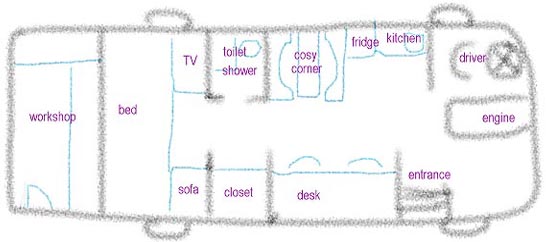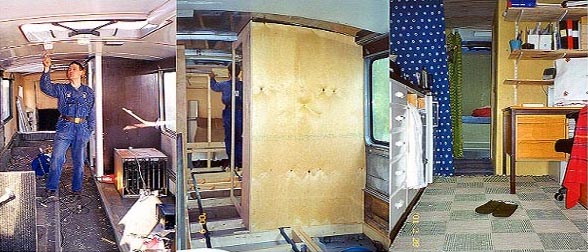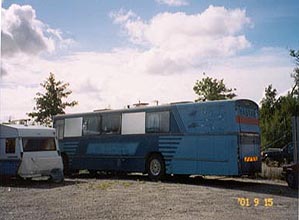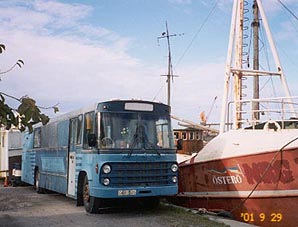在收拾。
碰到自己用HTML 寫成的第一個網頁。
像前世的回憶了,為紀念掏出來分享:
【舊居 CAH 525】
移民瑞典一年之後,我們買下一輛舊巴士,
改装為流動之家,住了兩年多,
到方芳出生前才搬回正常的寓所。
1973年瑞典Scania 出產:

Model
Scania B110
Manufactured
1971 in Säffle, Sweden
Type
Single deck passenger bus
Dimension
11.75m(L) x 2.5 m(W) x 3 m(H)
Weight
11,950 kg
Engine
Scania D11
Fuel
Diesel
Chassie
Scania, Sweden
History
1971- Passenger bus in Norrland
19XX- Horse transport for riding competitions
Dec 1999- January 2003 Mobile home of Eva&Peter in Gothenburg
車內平面圖:

立體生活照:



一手一腳改裝記錄:




流動的家:






~ Top 5 FAQs ~
* When did you start living on the bus?
Since October, 2000.
* Can you drive the bus?
Yes, of course. That’s the purpose of the whole thing.
* Isn’t the bus too small to live in?
Not really for Eva cos she has enough compact living experiences in Hong Kong. For Peter it’s alright after some bumping into the ceiling…
* Do you feel cold in the bus during winter?
Thanks to Peter’s invention of a diesel burner. We have central heating system all inside our home bus. Average room temperature is 19 degrees.
* Do you have electricity and water in the bus?
Yeah, think it as a normal flat. We have normal 220V electricity and running water supply, and a stainless 320 litre water tank for road trip too.
~ Technical ~
* Is there enough space for all your stuff?
Surprisingly yes. We have storage under the floor, bed, TV and sofa.
* What about telephone?
Newly installed in October 2001. We plug our telephone cable to the socket in the main storage building next to the bus.
* And internet connection?
YES! A great leap forward of our mobile living. This homepage was done on the bus.
* How to deal with sewage water?
Drained through an outlet hose from our zincs in the kitchen, toilet and shower directly to the sewage out on the public ground.
* Wouldn’t the water freeze in winter?
That actually happened. That’s why we installed a heating cable running inside the hoses.
* And the…..shit?
We have a 200 litre tank designated for our…shit. The bad thing is we have to empty it regularly.
* Who is repsonsible for that lousy job?
Doesn’t it sound more like a man’s job?
* Are you able to do cooking and laundry?
That’s a woman’s job – with the help of a gas stove and a normal washing machine onboard.
~ Practical ~
* How much time did you spend on fixing?
Long enough. Basically the whole summer in 2000. There are still some small things to build now, like bookshelves over the bed.
* How much money?
Less than SEK 80,000/HK$ 70,000 for purchase of the bus plus all fixing so far.
~ Mental ~
* What’s the major difference between living in a flat and a bus?
The sense of ownership, the freedom of changing anything anytime, though we have to take care of literally everything ourselves. But then we’ve learned a lot too.
* Learned what?
Various practical solutions in various situations. Like Mr. Burner stopped working in the middle of the night when it was -5 degrees outdoor.
* What did you do then?
Poor Peter had to get off the warm bed, put on his winter jacket, go outside in the icy cold and step into the workshop at the end part of the bus, and turn Mr. Burner into electrical mode instead of diesel.
* O god! Are you going to live inside the bus forever?
Nonono, home bus is just the first step of our mobile living.
* So what’s the plan?
We will drive the bus around for vacation. First destination is up north in Sweden in summer 2002.
~ Vital ~
* How did the whole idea begin?
Peter: Well…how long time u’ve got?
Eva: Well…doesn’t that sound fun? How would you know it’s a bad idea if you don’t even try?
* Last question: Why? Isn’t it more comfortable to live in a normal flat, buy a house or whatever?
Well…Why not?…since life is what you make it.
that was amazing! what a lovely life .
Amazing! It was my dream N years ago. Thanks for sharing.
Making dreams come true is in fact easier than you thought.
welcome Ada!
Wow, I am deeply impressed! You are very brave, and at the same time, I believe it is fun to have your loved one living there together.
Stephen Chan
酷
this is sooooo COOL!! what an experience! tho it might be a little crowded to live in after you had your kids, but i guess they might love it, if you’ve still kept it in your garage. !
too bad we sold the bus after our big daughter was born. she did spend a nite there:) sometimes we joke about: let’s get a double-decker, those old english red one. would be fun haha!
Wow, double decker!!! I think it’s difficult to drive.
我 search: Myrorna 然後走到這裡, 發現一個香港人的她鄉的故事, 很有趣. 我都好想嫁雞隨雞 (especially european), 離開香港! 我自小跟父母從北京移居香港, 在這裡 over 30年了, 但都冇歸屬感, 始終唔鐘意呢度生活. 我喜歡歐洲, 歐洲人 creative.
請問改裝歷時幾耐呢? 咁你有冇工作 -當時&衣家? 可否告知你同虾子餅係點識嘅呢? sorry if u think i’m 八掛, 我好鐘意知道 別人的故事, but not 私穩.
祝你 forever 幸福快樂! ^ ^
glad that u like wht we crazy people do, Queenie!
i have the feeling that you can run even further:)
Haha, that is fantastic Eva, you are as crazy as me! We can be really good friends. lol
因為我們毎天都在追!!
追求,追夢,追逐,追究….追追追….. 太多要追的…..
Gwen, 其實許多時候枷鎖是我們加諸自己身上的。
我想說你們很利害!!
要先塊地放trailer。而家百物騰貴,無能力再買塊地了。
That looked like one heck of a project! We lived in a “construction site” for a long time too when we first got married. But we were fixing an old house, not a bus. We know a guy who lived in a bus for quite some time. Finally he couldn’t hack it and moved onto a boat.
RV (recreational vehicle) travel is really appealing. We dream about owning one from time to time. But at the end, renting one makes a lot more sense for us than to actually own one. We are trying to downsize our lives at this point.
點解難呀讀食?
Wowwow…I just discovered this article. Sorry for being so late.
噢,做乜轉咗台講英文?﹗
廚神也想買一個trailer,當作summer house。現在,這夢想很難實現了。
Hello Jay, what I meant for “culture based product or strategy” is …..is a …a secret. Well… there is nothing new but an attitude to take various technical and social issues into one eco-design or eco-plan. It could an industrial design stuff, a building, a business, a community, or a city, depends on the scale and how much you’d love to integrate these topics into one practical target. I know my description is not so clear yet. Anyway, that’s why I wanna provide consulting service to the others.
: P
I’ve been to KTH in Stockholm for a conference several yrs ago. I learn a lot from Swedish as well.
Bruce, thanks!
You mentioned about “culture based product or strategy”, can u share with me more on that?
I know too little about the environmental and energy field, but learn little by little from my husband. I find it fascinating that there are in fact many people who care and engaged in the field, like Bruce and P here.
Here in Sweden it is an important issue. At least the government, schools and commercial corporations are eager to take the initiative to inform the public. Media sometimes play its good part too. We just received a letter from a new kindergarten nearby. They have “sustainable development” as the focus in the syllabus, meaning they emphasize the nature in all activities. I was impressed and thinking of applying a place for our small daughter. You know my husband has been half joking that we’d better aim at a self-sustaining energy system at our home for the long run, and i know he means it seriously.
Oh Haricot, camping can is almost like the icon of certain American class isn’t it? Is it the same in Canada? We didn’t have the luxury of having carpet in our home bus before, but I was enthusiastic enough to paint the wall into tomato red haha! Yes, those were the hippy-trippy days:)
I used to own a “camping” van when I was living up in Flin Flon, Manitoba, Canada. It was not a mobile home like the one you had, but it was handy-dandy when I wanted to go fishing or spend time on the road. My friend called the van my “shaggy wagon” cuz I had wall-to-ceiling carpet and a bed inside.
Those were the hippy-trippy days 😀
Hello there,
Yap. my current career is trying to explore and extend the possibility of the business and the environment. Eco-industrial developemt(EID)/ eco-industrial park(EIP) is the specific field I’ve engaged for a decade. For I used to be an architectural designer, there is a tremendous potential for industrial ecologists to expand EID. For example, how to integrate the low carbon and subsidies with a culture based product or strategy….,etc. Well, good to know we got something interesting in common. Maybe we can exchange more via e-mail. ^_^
流動旳家…想起forest gump…不斷的跑…也是流動的家 🙂
Ah! Sorry to interupt! My work is related to renewable and low carbon energy…
Welcome Bruce! I am glad that you like it!
Life is how you make it. Everyone has the power to fulfill his/her dreams. We were curious and young, we thought trying it out would not make any harm. Living on wheels turned out to be a very good learning process, about living and more importantly, ourselves.
It was pretty narrow but enough. Amazing to myself too that we could actually live on minimum “stuff”. Now we are a family of 4 and just moved into a house, I started to unpack and dig out way too many “stuff”. We aim to fix up our home with the things we already have, old fabrics turn into new curtains etc.
Eco-Industrial Development Network is your work? Please tell me more! My husband is working in the research field for future energy alternatives too.
Wow~~ Amazing~~~ Things on the film came true in your real life. I cannot imagine how it was to live in a floating/ moving house.
ff was sleeping there too as a baby, we were painting the bus before selling it.
wowow~ this sounds very interesting ~
Did you show to FFYY?
it was a past chapter, so we sold it after moving back to “land”.
we drove it around along the west coast in Sweden up to the border to Norway that summer, it was big fun:)
we went to visit my man’s folks during holidays and weekends too. bringing our home along and offered friends coffee and lunch. i think people thought that we must be nuts or something, preferring the troubles over the comforts….
experiences do not guarantee the best result, but it is the process that we should be living in, don’t you think?
even now i’m a mom, i still try to make our daily lives a bit less expected:)
wow wow wow!! What a project! i’ve just discovered this artlcle! Did you keep the bus? Where did you travel with it?